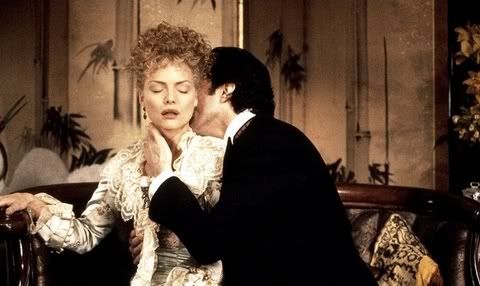
Opinions on Scorsese’s greatest film can very generally be divided into three camps. There’s the IMDb/Empire whores who rally behind Goodfellas , there’s the Sight & Sound croud who hail Raging Bull and then there’s the twisted weirdos who love Taxi Driver . Personally, I love all three to death. After seeing The Age of Innocence for the first time, however, I’m feeling the need to start a new sect designed to appreciate this forgotten gem in the director’s oeuvre
Violence is at the forefront of the three established Scorsese masterpieces, so upon first glance this lush period drama seems rather out of place in the director’s back catalogue. Look a little closer however, and you’ll find that the lavishness harbours a psychological combat zone that victimises those who fail to conform to this upper-class society’s unwritten code of conduct. Such a fate initially befalls the exotic Countess Ellen Olenska (Michelle Pfeiffer), a woman oblivious to these social mores, before she’s rescued by the well-meaning Newland Archer (Daniel Day-Lewis). The pair become romantically entangled, despite the fact that she’s married (albeit unhappily) and he’s engaged to society darling May Welland (Winona Ryder). As their peers gradually awaken to their potential affair, those that Newland and Ellen hold nearest and dearest quietly manoeuvre in the background to repress their desires before a dreaded scandal ensues.
Scorsese’s realisation of 19th century New York is sumptuous right down to its very core. Magnificent sets and glorious costumes combine with cinematographer Michael Ballhaus’ breathtakingly sinuous camera to create a vivacious evocation of an era gone by. So exhilarating is the film’s energy, that one could almost be forgiven for missing the fervent undercurrents of passion and deception that the mise-en-scene conceals. I say ‘almost’, because Scorsese is, at heart, concerned with his characters above all else. The parallels with his other works are striking, for The Age of Innocence is all about society’s outsiders. Ellen Olenska is much like Travis Bickle in that all she craves is acceptance, and Newland’s desire for her makes him an obsessive wreck a la Jake LaMotta. Society predestines everything here, but although it prides itself on morality, it’s exposed as nothing more than a hypocritical joke – thereby lending the title a wicked irony. The film’s material exuberance is a thin veil for the emotional hollowness that the supporting characters actively breed. Note how Larry Lefferts’ standing in society ensures that everyone ignores his philandering, while the very people who ignore his immorality attempt to quash the genuine love felt between Newland and Ellen. Even more tragic is the fact that Newland might well be the most idealistic person in the entire film, as we discover during the touching finale.
The Age of Innocence finds Scorsese at the peak of his directorial powers. His stylistic approach regularly emphasises his characters’ roles as ‘outsiders’. Take a scene at the opera which finds the romantic duo already distanced from others in a theatre box. Scorsese utilises an iris shot to highlight this point, before rendering silent all outside sound to make us feel as if we’re entering the private world of Newland and Ellen. It’s a sign of a director that never wastes a shot, whose every frame is discreetly used to augment his narrative. It’s appropriate then, that said narrative should be dealing with a world where each word and gesture tells a part of the story - such as May Welland’s final scene where she quietly communicates her enormous depth of understanding; or even something as simple as Newland undoing Ellen’s glove, a moment of unbridled catharsis for both involved. Scorsese’s Age of Innocence is very much a sweeping romance, but it’s infused with an intellectual vitality that’s often lacking in the genre and the charismatic performances of its two leads (seriously, Day-Lewis and Pfeiffer NEED to work more often) will cause the viewer to ache for every moment that they don’t share. Hopefully time will provoke a rediscovery of this sorely underrated work.
No comments:
Post a Comment